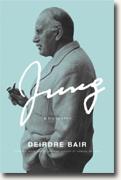Deirdre Blair
book reviews:
· general fiction
· chick lit/romance
· sci-fi/fantasy
· graphic novels
· nonfiction
· audio books
· author interviews
· children's books @
curledupkids.com
· DVD reviews @
curledupdvd.com
newsletter
win books
buy online
links
home
for authors
& publishers
for reviewers

 |
Jung: A Biography Deirdre Blair Little Brown & Co. Hardcover 860 pages November 2003 |
|
Purists complain that Jung was a philosopher, not a psychoanalyst; supporters suggest that it is precisely his philosophy which has helped his work endure. After Freud, there had to be Carl Jung. Jung crossed the bridge into the new age.
As one ploughs through the minutiae of Jung's life - and this is not a tome for the novice - one finds some justification for the less than slavishly adoring depictions of this mental giant. He mistreated his wife, both through benign neglect and by having other women in his life most of the time. Everyone knew, no one said anything, and Emma suffered in silence. Like Freud, Carl Jung was a genius who seemed obsessively concentrated on the workings of his own mind. For instance, he remembered all his life a dream he had at the age of four and kept developing new interpretations of it as his discipline evolved. He was Freud's greatest disciple. Like many distinguished followers, he was destined to lead, and so parted company with his master. Arguably, Jung's was the greater contribution, capturing the imagination of a new generation in a way that Freud could never have done. From being "lax and disorganized" early on when he worked as a medical administrator - he used to accomplish his rounds by shouting up the ward "Is there anything interesting going up there among you?" and then move on - Jung was increasingly beset by requests for lectures and consultations as his international reputation grew. He met many of the great men of his day - Hermann Hesse, James Joyce, Alistair Crowley -- as well as every luminary of the world of psychoanalysis. His connection with fame extended to a near-meeting with Adolf Hitler, which he declined. History might have taken a different course had he agreed, since the request came from a cadre of high-ranking German officers who were concerned about “Hitler's increasingly erratic behavior" and "wanted him to be discreetly observed and evaluated...by an analyst from a neutral country." Armed with this evaluation, they hoped to convince other "government officials and military personnel to join in ousting the dictator and ending a war they knew they were losing." Jung's refusal was probably more to do with ongoing rows with the Freudians, whom he suspected of trying to link him with Hitler in order to discredit him, than with any special revulsion for the task. Despite the litany of faults which any thorough reading of the life of this great man must inevitably reveal, it is Jung's brilliance and the beauty of his ideation that sticks with us. His terminology - collective unconscious, archetype, extra- and introversion - has become, like Freud's "ego" and "id" before him, part of our way of thinking and feeling about thinking and feeling. New concepts flashed off him like fireworks; one which spoke to this reader was his "Syndrome Ambulatoire," in which "people are seized by something like an urge to travel, have an amnesia concerning the past, and just travel or run away." About UFO's he said, "Something is seen, but nobody knows what." Referring to the rise of Fascism in Germany and Italy, he stated "Give an archetype to the people and the whole crowd moves like one man, there is no resisting it." On the eternal battle of the sexes, he profoundly observed, "Women are 'far more psychological than men' who are 'usually satisfied with logic alone.’" Many of Jung's theories live on in a watered-down version as bits and pieces of "pop" psychology, a phenomenon he would probably have disdained. He wanted to be larger than that, a myth rather than an analyst of myth. But success is not always where we seek it. Perhaps for the masses, the watered-down version is essence, and, in its way, the superior product.
|
|
|
|
 Click here to learn more about this month's sponsor! |
|
| fiction · sf/f · comic books · nonfiction · audio newsletter · free book contest · buy books online review index · links · · authors & publishers reviewers |
|
| site by ELBO Computing Resources, Inc. | |
 This big book, written by scholarly biographer (Samuel Beckett, Anais Nin, Simone de Beauvoir) Deirdre Bair, is her attempt to piece together every scrap of paper available on Jung and to present him whole, having found most previous biographies to range from "supercilious, smug, and condescending to the scathingly negative."
This big book, written by scholarly biographer (Samuel Beckett, Anais Nin, Simone de Beauvoir) Deirdre Bair, is her attempt to piece together every scrap of paper available on Jung and to present him whole, having found most previous biographies to range from "supercilious, smug, and condescending to the scathingly negative."